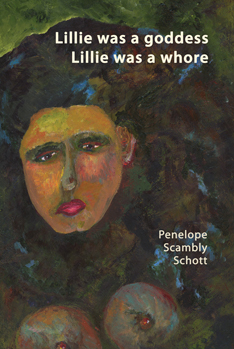Book Review
Penelope Scambly Schott, Lillie Was a Goddess, Lillie Was a Whore, Mayapple Press, 2013
by Sherry Chandler
Lillie Was a Goddess, Lillie Was a Whore is a grating book. It is meant to be. It is an unvarnished survey of the history of whoring, not the Latinate prostitute but the blunt Anglo-Saxon whore. The choice sets the tone of the book.
These poems track the career of the mythical Lillie from sacred temple courtesan to a Conestoga wagon in the American West and ultimately to Craigslist ads. It’s a downward trajectory. Lillie is associated not just with Lilith, the sexual rebel, but also with Lily Bart, the protagonist of Edith Wharton’s House of Mirth, who recognizes that her beauty is her only commodity on the marriage market. And possibly to the parodic sexuality of Mae West’s Diamond Lil.
Schott uses a number of devices to keep the reader from finding an equilibrium: abecedarian lists of what he calls his penis (from “ass candle” to “zucchini”) and what he calls the whorehouse (from “academy of love” to “zipper zoo”), a clinical definition of syphilis with treatments, personals ads, and a found poem from My Secret Life by “Walter:”
what a godsend
having a cunt is
to many women,
who would starve
without it (p. 26)
Even in her lyric moments, the poet can be as frank as the Earl of Rochester in her language:
The champagne our customers order
and pour into crystal goblets in the parlor
tastes liked bubbles mixed with spiders
and cold piss.
(Lillie Used to Eat Oatmeal with Fresh Cream, p. 39)
Men do not fare well in these poems and husbands fare worst of all, with their requirements of “sex every night,” boring and passionless, to be “checked off the calendar.”
Two repeating threads run through the book, stitching it together. The first,“Why Lilly Became a Prostitute,” versions 1 through 7, tells the old sad stories: “Because Father was a preacher,” “Because we were orphans,” “Because he came to the farm with his banjo,” etc. The second, a series of untitled jingles that occur randomly throughout the book, italicized and tucked under the page’s poem like a footnote. Structured like nursery rhymes, these jingles are some of the wittiest poems in the book:
Lillie was a banjo, Lillie was a gourd
When I came to Lillie’s house,
I sang out Praise the Lord.
Like Mae West, Lillie Was a Goddess, Lillie Was a Whore is drawn in broad strokes, and some of the poems teeter on the brink of a West-like self-parody. It is not a book that deals in subtleties. Nor does it romanticize. It is angry but it is also funny.
Lillie Was a Goddess, Lillie Was a Whore opens with a prayer of praise to Inanna:
I am singing the vulva, source of creation,
the genital waters the harlot-place,
the holy place, the permanent Mother.
(“In the Beginning, Prostitutes Were Sacred,” p. 9)
and closes with a plea to Aphrodite:
Aphrodite, in your service
see how I have grown old
. . .
Send me a blind man
with a wrinkled member.
Lay him down on my golden couch.
Now and forever, watch how we sparkle.
(“Deathless Aphrodite of the Spangled Mind,” p. 82)
Sherry Chandler is the author of two poetry collections, The Woodcarver's Wife and Weaving a New Eden. Chandler lived in Chicago for six years during the 70s during which time she is sorry to say she never once traveled over into Wisconsin. She is, however, a Facebook friend of former WI poet laureate Marilyn Taylor.


